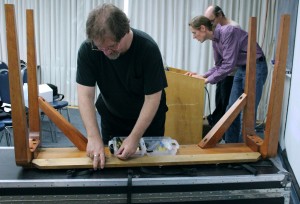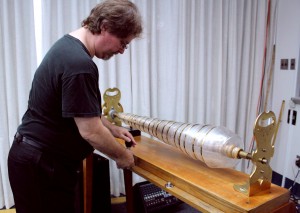At a May 10 reception held in the CNSI Auditorium, Earth & Space Sciences’ Hilke Schlichting was awarded the 2012 Chancellor’s Award for Postdoctoral Research at UCLA. This award honors important postdoctoral contributions to the university’s interrelated missions of research, teaching, and public service.
Hilke is a theoretical astrophysicist interested in the formation of planetary systems, and has been a Hubble Postdoctoral Fellow at UCLA since 2010. Her diverse research accomplishments at UCLA have addressed different aspects of the Kuiper Belt, which is a ring of a billion bodies located beyond Neptune, discovered in 1992 by David Jewitt, also of UCLA Earth & Space Sciences. The Kuiper Belt is central to planet formation studies as a primordial relic of the accretion phase. It is also the source of short-period comets.
Recently, Schlichting used Kuiper Belt binaries (double objects held together by gravity) to assess the outward motion of Neptune 4.5 billion years ago. She then formulated a collisional growth model to understand the size distribution of Kuiper belt objects, extending this model in another paper to account for velocity dispersion in a self-consistent way.
Stepping outside her “theoretical” training, Hilke conducted a massive analysis of Hubble telescope data in search of occultation events, finding two (to-date) in competition with much larger, international groups of observers who have so far found none. As a side-project, she discovered a simple explanation for a long-standing puzzle concerning the addition of late-added material on Earth (detected by geochemists) and, with ESS’s Paul Warren, wrote one of the few papers ever to have both dynamicists and geochemists as authors.
Watch Hilke describing her research in the videos below:
http://www.youtube.com/watch?v=09jYeadv7mk
http://www.youtube.com/watch?v=sugR_bKC7v8
Hilke Schlichting’s Webpage



